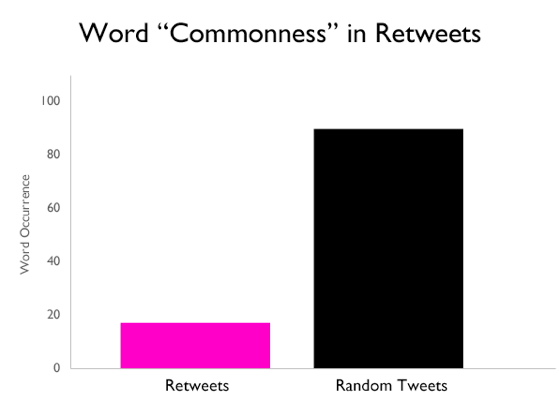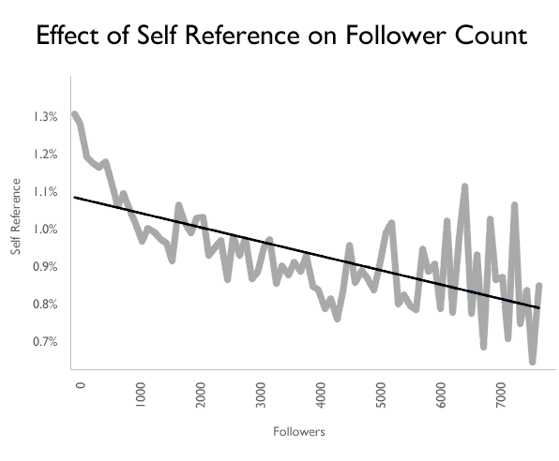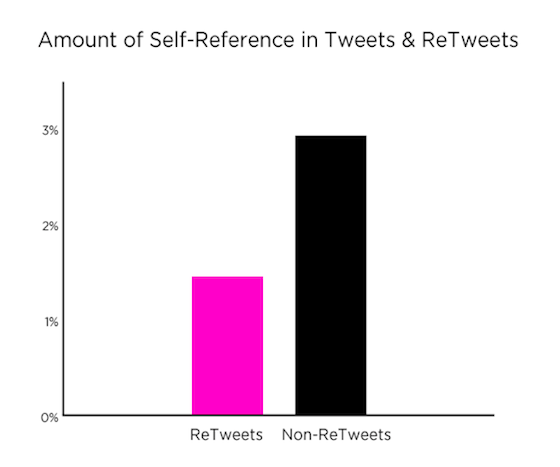Over the past few years, I’ve conducted a number of focus groups on subjects ranging from email marketing to blogging.
When I ask participants why they’ve chosen to receive emails from a particular source, read a specific blogger, or follow a certain Twitter user, they give me a variation on the same answer:
“Because I like their unique point of view.”
Readers will only listen to you if you’re giving them something they can’t find anywhere else.
Why would they pay attention to you if you’re saying the same things that everyone else is saying?
That’s common sense — but is there evidence that supports it? Actually, yes there is.
My numbers-based research has confirmed the importance of uniqueness and novelty. The data shows that novelty is contagious; ordinariness is not.
If you take a look at the graphic below, you’ll see that Retweets contain more unusual words than ordinary Tweets do.

No, that doesn’t mean the word commonness gets Retweeted less often. 😉 It means that Tweets with uncommon words get Retweeted more often than the usual things we see every day. Having a unique way of expressing yourself will earn you more Retweets.
Escape the echo chamber
Your readers don’t want you to say the same things everyone else is saying.
If you simply regurgitate information from the echo chamber, they won’t spread your content, and eventually they’ll get bored and stop listening.
Heeding this advice, it could then be easy to conclude that you should talk about yourself as much as possible. Because after all, what is a more unique perspective than what you’re doing, thinking, and feeling?
Well, that’s a little right, but mostly wrong.
First of all, when I’ve studied Twitter accounts, I’ve found a negative correlation between self-reference and number of followers.
In other words, the more you talk about yourself, the fewer people are interested in following you.

And when you’re talking about individual Tweets, Retweets tend to contain much less self-reference than ordinary non-contagious Tweets.
People don’t want to listen to you Tweet about yourself all day long, and they’re certainly not going to Retweet it either.

So where does all of this lead us?
People want to hear our unique perspectives and points of view. But they don’t want to listen to us talk about ourselves.
Talk as yourself, not about yourself
Your take on industry news is interesting. Your daily minutiae is not.
Your unique analysis of best practices is something I’d like to read. Your regurgitation of time-worn adages is not.
Whether it’s your personal brand or a corporate brand, you have a set of characteristics and perspectives that allow you to look at the world in a novel way. Use that.

Reader Comments (52)
That first one is really interesting. I have a theory that a lot of retweets (with these uncommon words) are often things people wish they would say themselves, but they ‘hide’ behind the retweet a little while making their point. I’ve noticed this in s3x (Akismet) jokes and similar.
Nice research, Dan 🙂
Thanks Dan,
It’s like anything in life, you are actually way more interesting when you get out of your head. It’s a paradox, the less you talk about yourself the more interesting you are to others.
Incidentally for an actor the one way to stay alive and engaging is by taking attention off themselves and by listening to others in the scene.
I think this would work for tweets too… it just takes faith to let go of your own agenda and trust other people.
Geoff Talbot
Staying In The Moment
Thanks Dan, Interesting analysis. I agree that expressing copy in your own voice is necessary. It brings natural persuasion outside. Anyways if one writes with passion then own voice becomes evident.
People like to talk not listen, so talking about oneself is pretty much worthless. Even when talking about oneself, copy should be directed somehow towards the reader.
Ofcourse finding unique perspective is the difficult part or lets say more demanding. As my physical trainer says when I fail my last deadlift “if this way easy, everyone would be doing it”
Perhaps this explains why Brian gets so many retweets while yelling at the football?
This is such a no brainer, but people tend to forget it. No one wants to talk to the person at the party who only talks about herself. Same goes for social media, which is sort of like a big party. Thanks for reminding us with this post. I tweeted it.
It’s also a great way of pointing out that social awkwardness in the real world (like might happen at a party) translates very often into the digital world. If you can’t make friends and attract people to your personality in real life, you won’t do it on Twitter either.
But what if people like you in real life?:)
Could bots have heavily influenced the first portion of the results? How were the data collected over what time period?
“Your unique analysis of best practices is something I’d like to read. Your regurgitation of time-worn adages is not.” Great advice for any aspiring blogger.
I try to draw from thought leadership posts and articles, and then interject with my own point of view. Some folks won’t like my authentic ‘voice’, but I suppose that’s just too bad. If I contrived a voice in an attempt to please the masses – I have no doubt that some readers would find it objectionable as well. You can’t please everyone all of the time.
I think this post is an awesome conversation starter, mainly because I’m interested in the variances across industries. It brings up a lot of good points too about the importance of taking 5 seconds to put an interesting spin on a retweet that you’re sharing.
I can guarantee (personally) that I would be more interested in reading an article that had a snarky/interesting remark added on to it, rather than reading a post that someone has just clicked “retweet” on that gives me no clue as to whether they even took the time to open it or not.
With that said, I think it would be interesting to have a series of follow up posts that run the same tests over different industries. I think a little more information on the sample size and demographics would be interesting, too.
For instance, it’s a fair assumption that there’s an abundance of users within a certain age range and demographic, that absolutely consume and retweet celebrity/famous people’s tweets. Even when they talk about themselves or present things of little value. Sad, but true.
Whereas in certain other industries – let’s use development or programming as an example – it’s more resource heavy and more community-sharing based.
Thanks for sharing, Dan. Looking forward to more. 🙂
Great points, Selena. Segmenting the results by demographic, industry and other information could be very revealing. As Roger pointed out above Twitter bots can also potentially skew the results. Were these taken into account?
This is another award-winning post from Copyblogger: “Talk as yourself, not about yourself”
I’ve gotten so spoiled over the years by some truly awesome Copyblogger posts that I’ve gotten picky, and I’m always happy to find another post, like this one, that makes me take the time to read slowly from start to finish, to really listen and digest, and then it changes my day and direction. Thanks! I love surprises and inspiration!
I’d like to meet more people who “speak” this way, talking as themselves, and less about themselves, both in person and in writing.
Thanks again for another awesome post topic well-said that I won’t forget. If I was on Twitter, I’d retweet it. I love birds but I don’t Tweet.
That is why I open mails from ‘hubspot’. I always get value. I have tried to implement this as I blog and like Peggy above, I read and digest so that I can form my own opinion on things. Thank you Dan for your tips.
I love the way you put it: Talk as yourself,not about yourself.
That is absolutely brilliant and very helpful. Thank you.
Hi Dan,
Key points here.
I started RTing inspirational quotes recently. My quotes…over 1000 of them. Mind you, I toss in a few a day so my stream is still cash gifting focused, but some of these generated serious RTs because they are different from the oft RTed pearls of wisdom.
Also noted how using colorful or “rare” words raises eyebrows, and generates nice RTs. Take the time to craft something different, to generate more traffic.
Thanks for sharing with us.
RB
Interesting, I tend to unfollow people who post a lot of quotes because it”s such a common thing for bots and spammers to do. Quotes are generally quite impersonal.
In other words, “Tweet different.” 🙂
I come for the great data, I stay for the two-word distillations by CopyBlogger staff. Awesome.
Shane says that should be “Tweet differently” 😉
Great post. Goes well with the item in The Lede from last week: http://www.niemanlab.org/2011/03/tweet-late-and-e-mail-early-using-data-to-develop-strategy/
You guys rule.
Really good topic, Dan!
I’m with Sharon Fiberesima … HubSpot ropes me in with every email subject line. When I click over to the posts, I always get educated, entertained, and enriched by someone’s unique “take” on a subject.
And there are certainly no “copy cats” here at Copyblogger!
The ONE thing your target audience can’t get from your competitors is … YOU. 🙂
I’ve been thinking about this lately and have been planning to do a study myself.
The question I’d like to answer is this: Do people follow blogs more to follow people or to get amazing content? I’m convinced that a greater portion of e-mail subscribing is related to the person people want to follow than the content, although the content still needs to be great and Copyblogger is an example of a site where people subscribe more for the content than for the people (not that the people aren’t cool; the content is just that awesome).
As this article states, and if people do mostly like to follow people, it makes the most sense to talk as yourself, although not about yourself. You talk as yourself because this brings a unique point of view, but you don’t talk about yourself because people always care more about themselves than they do about you, unless, of course, your name is Ashton Kutcher.
It looks like I need to get around to doing that study. . .
Any thoughts?
Talk as yourself not about yourself, is great advice. Not everyone is good at in person social interaction, and same is true for social media. I do feel it’s more pronounced on social media, meaning if you’re not a great social butterfly offline, you may worse online.
Certainly something to work towards and solid advice!
Interesting research Dan! I wonder if part of the reason tweets with more uncommon words are more retweetable is partly because they might also be noticed more easily as Twitter users skim through their streams? Did you notice any other kinds of trends within the uncommon words themselves? For instance, did they tend to be emotionally charged words, slang words, etc? I think it could be interesting to dig into that a little further too.
Excellent advice! I think we fell victim to the Echo chamber when we started out because we didn’t want to offend anyone and we just wanted to get good solid information out there. But you have to put yourself into your content or you really will sound like a robot. What’s interesting is that Google’s algorithm actually encourages this now.
Nice pieceDan. So what it really boils down to is the golden rule: tweet others as you would like to be tweeted. No repeat after me: tweet and retweet were in a boat. Tweet fell out. Who is left?
🙂
Rick, you really hit that. After watching a couple of videos by Gary Vaynerchuk, treat others as you would like to be tweeted seems like a good strategy.
I’ve learned a lot from this post specially finding a unique angle for contents that will set apart from the rest and likely to get more retweets from satisfied visitors. Social media marketing is now the in thing of promoting products and services online for it will strategically build links that may survive every Panda update.
Your observation here is extremely interesting but not particularly surprising. In normal conversation, most people want to talk about themselves, so if you want to be the life of the party, the easiest way to do so is to direct the conversation constantly toward those around you. People readily become bored with others but are consistently and constantly fascinated with themselves. Thanks for the insights!
I like the idea behind this, but to me it seems that you’re saying to not talk about yourself by talking about topics perspectively–joining or creating discussions.
Correct me if I’m wrong.
This is a great advice no doubt.. 🙂 I do think the social media have been a little bit to much about people themself..
Great point to “talk as yourself”. Social media is a place to show off some personality on behalf of a business. It’s slightly less formal than other forms of business communication. People follow a business in social media to get to know them better.
Thank you Dan,
I really enjoyed your post and the data back up what you say. Talk as yourself is so obvious yet many bloggers forget who they are. As keys are clicked and words pile up, soon enough a third person voice sneaks in and attention spans divert. In the social media world seeking to be yourself will help to keep readers engaged and interested in the remainder of what the author has to say. I really enjoy your blogs and read them over and over again. Keep up the great posts!
I totally agree with what you outlined. Also, its a good thing to also post facts as well, since this has helped to prove your point with what you are trying to demonstrate. We should all strive to find a unique voice in what we do and from there we can see the ability to build our brands if we focus as talking like we normally are.
So very true, friends. This speaks in general to the fact that people simply don’t know how to listen, and the tweets about themselves are the social media manifestation of that. Good writers imply a selfless quality in their work, while being specific and walking the different path. Nice article!
Su
Great advice. The secret to selling yourself (or your product, or your services, or your ideas, or anything else) is to put it in a unique and interesting package. Everybody eats dinner – not everybody can offer the unique business insights that you have. Tweet with your mind, not with your senses!
I would have thought talking as yourself would have given the impression you are opinionated which I understood was not admired as a trait in people, but maybe it is then. Food for thought.
I share blogs in social media too. Of course, the blog should be of value and unique to make me push the button of sharing it. Social media is where the people are and when people share your blogs in their pages that would definitely increase your sales. However, to see this result one has to make a lot of thinking when making a blog.
Talking about oneself sometimes gets quite intoxicating especially if there is no one to tell you to stop. Actually most people never tell you. The good thing is that you can feel it – when people start feeling uneasy around you. You’ll notice:
1. More people unfollowing you
2. More people unliking you
3. More people unsubscribing from your feeds
4. More people never coming back to your blog and so on
What I’d like to say is that if you cannot find ways to stop talking about yourself, learn to talk about yourself cleverly (not in a way that makes you look like a know-it-all, proud, hot-tempered, proud or arrogant).
I am sure most people can find what works for them, and there will be certainly some help coming from fellow bloggers, readers and mentors.
Happy blogging Dan.
This is so true, especially when you see companies tweeting about how many followers they’ve got or how many they need to reach their next milestone. My initial reaction is, ‘So what?’ Another common mistake is offering something to the 20,000 or 100,000 follower – always results in lots of (justified) complaints from the other 19,999 or 99,999.
Very interesting post, and very astute. This is especially true in marketing a product or service. The blogger’s opinion doesn’t matter; readers just want to know about what’s being sold. That’s what brought them to the post in the first place, and that’s what will keep them following. It’s a skill that many will try but few will master. For those who struggle, seek out professional help. There are a number of experienced companies out there with writers who possess the skills needed to walk the fine line between self-promotion and a good product pitch.
Some good points here. It’s so much easier to just write the same thing everyone else is writing. To mull over it and let it settle in your own life before you share things, or to sit back and observe a while before you speak takes quiet time, a slower schedule, and more of a sense of timelessness. The problem is the online marketing world changes so fast we feel it’s necessary to keep up, and that rushes us into carelessness.
Thanks for this great reminder to slow down and think a little; to allow your personality to shine through your writing.
When someone writes an paragraph he/she maintains the idea of a user in his/her mind that how a user can understand it.
So that’s why this article is perfect. Thanks!
This article's comments are closed.